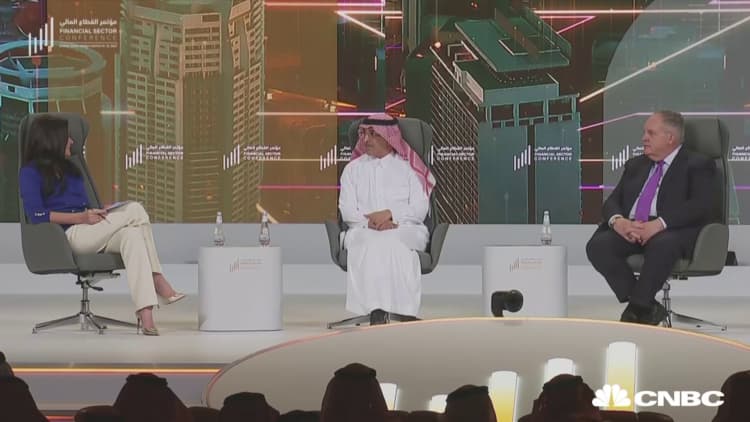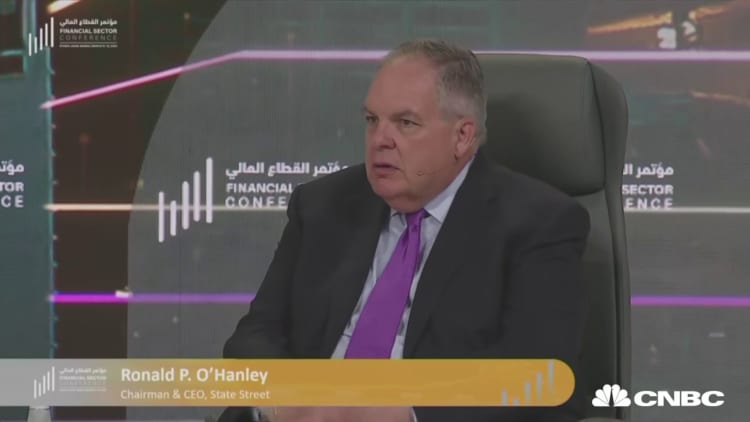Saudi Arabia could start investing in Iran ‘very quickly,’ finance minister Mohammed Al-Jadaan says

Saudi Arabia may soon be investing in its longtime regional foe Iran following a breakthrough agreement reached between the two countries to re-establish diplomatic relations, the kingdom’s Finance Minister Mohammed Al-Jadaan said Wednesday.
Asked by CNBC’s Hadley Gambled in Riyadh how soon the world might see the wealthy Saudi kingdom making significant investments into Iran and vice versa, Al-Jadaan replied: “I would say very quickly.”
“When people really stick to the principles of what was agreed, I think that that could happen very quickly. Our aim, and I think this has been made very clear previously by our leadership, is to have a region that is stable, that is able to provide for its people, and prosper. And there is no reason for that not to happen,” the minister said.
Riyadh and Tehran agreed to resume diplomatic relations and reopen embassies in each other’s countries following China-led negotiations in Beijing that culminated on March 10.
Iran’s top security official Ali Shamkhani (R), Chinese Foreign Minister Wang Yi (C) and Musaid Al Aiban, the Saudi Arabia’s national security adviser pose for a photo after Iran and Saudi Arabia have agreed to resume bilateral diplomatic ties after several days of deliberations between top security officials of the two countries in Beijing, China on March 10, 2023.
Chinese Foreign Ministry Handout | Anadolu Agency | Getty Images
They also vowed to affirm “the respect for the sovereignty of states and the non-interference in internal affairs of states,” a major step after years of mutual animosity, suspected attacks and espionage between the two countries.
Some regional analysts and Western policymakers are skeptical as to whether the countries — Iran in particular — will stick to the pledges, which has yet to be seen. The two Middle Eastern powers are still ideologically at odds, and neither countries’ suspicions of the other will disappear overnight.
Still, the Saudi finance minister appeared optimistic.
“Iran is our neighbor, and has been and will continue to be for hundreds of years,” Al-Jadaan said. “So I don’t see any issue that would prevent normalization of the relationship, cross-investments etc., as long as we stick to agreements — you know, respecting sovereign rights, not interfering in others’ affairs, respecting united nation conventions and others. So I don’t see any, really, impediments.”
The countries have additionally agreed that previous cooperation accords — namely a “Security Cooperation Agreement” from 2001 and a “General Agreement for Cooperation” from 1998 covering the fields of trade, economy, sports, technology, science, culture, sports and youth — would be revived.
“The three countries expressed their keenness to exert all efforts towards enhancing regional and international peace and security,” the Saudi statement announcing the deal said, referring to itself, Iran, and China.

The two major oil producers face starkly different economic realities: Saudi Arabia, investing internationally and launching trillions of dollars worth of mega-projects as part of the kingdom’s Vision 2030 plan to diversity away from oil; and Iran, whose economy and currency has spiraled under years of Western sanctions, government corruption and economic mismanagement.
Investment from Saudi Arabia would likely be a major boon for Iran’s battered economy, though it’s unclear whether existing U.S. sanctions on Iran would apply to financial activity between the two countries.
“I think, without going into details, I think we recognize … clearly that for you to be able to focus on your economic development and focus on providing for the people in your country, you need stability, they need stability,” Al-Jadaan said. “And I think there are a lot of opportunities in Iran, and we provide a lot of opportunities for them, as long as goodwill continues.”
Iran and Saudi Arabia have long accused each other of destabilizing the region and regarded one another as grave security threats, often on opposite sides of regional conflicts such as those in Yemen, Lebanon and Syria. Riyadh and Washington both accuse Tehran of being behind several attacks on Saudi ships, territory and energy infrastructure in the past few years.
Saudi Arabia cut diplomatic ties with Iran in 2016, after Iranian protesters stormed the Saudi embassy in Tehran in response to Saudi authorities executing 47 dissidents, including a leading Shia cleric.
For all the latest World News Click Here
For the latest news and updates, follow us on Google News.

